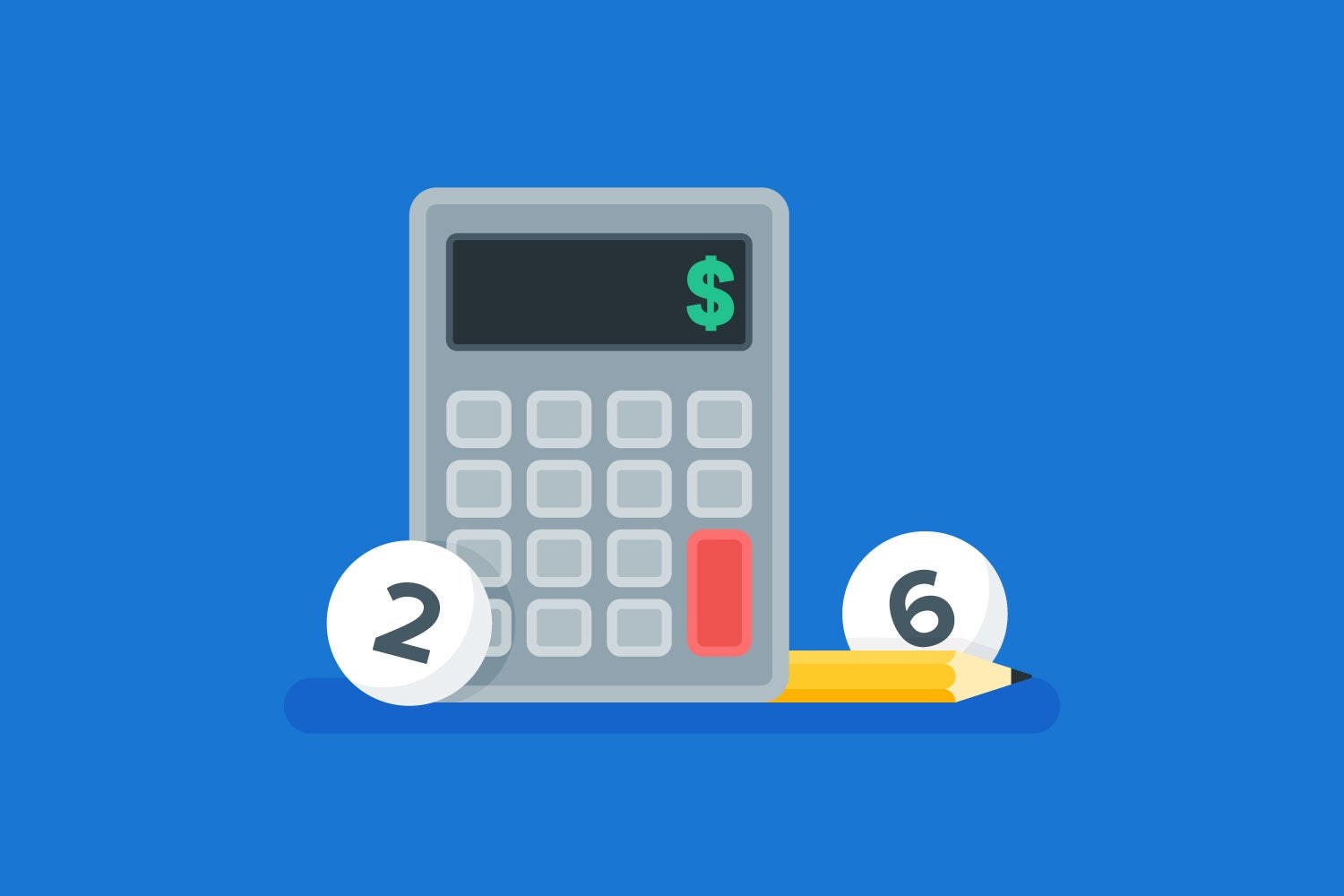The lottery is a thrilling game of chance. Checking your numbers after a big drawing to see if your ticket will lead to grander daydreams is all part of the fun. If you do find yourself holding the winning lottery ticket just remember: Uncle Sam and potentially your city and state will take a portion of the winnings.
So, how much are lottery winnings taxed, anyway? Our guide about lottery wins and taxes will give you an idea.*
Take note! We are not tax experts. For the official word on lottery winnings and your federal and state taxes, double check the gambling income rules laid out at IRS.gov, your state taxing authority and contact a CPA or tax attorney.
Lottery and Federal Taxes
Right off the bat, expect the federal government to take at least 24% of winnings over $5,000 upfront. Why? Lottery winnings are considered taxable income. Besides the upfront withholding, your total federal tax rate could be higher—up to 37%. If you win a big prize, for example, it’s very likely you’ll be pushed into a higher tax bracket when adding your lottery winnings to your regular income.
Let’s take a look at those tax brackets:
Tax brackets 2023 for taxes filed in 2024
| Tax Rate | Single | Married filing jointly | Married filing separately | Head of household |
| 10% | $0 to $11,000 | $0 to $22,000 | $0 to $11,000 | $0 to $15,700 |
| 12% | $11,001 to $44,725 | $22,001 to $89,450. | $11,001 to $44,725 | $15,701 to $59,850 |
| 22% | $44,726 to $95,375 | $89,451 to $190,750 | $44,726 to $95,375 | $59,851 to $95,350 |
| 24% | $95,376 to $182,100 | $190,751 to $364,200 | $95,376 to $182,100. | $95,351 to $182,100 |
| 32% | $182,101 to $231,250 | $364,201 to $462,500 | $182,101 to $231,250 | $182,101 to $231,250 |
| 35% | $231,251 to $578,125 | $462,501 to $693,750 | $231,251 to $346,875 | $231,251 to $578,100 |
| 37% | $578,126 or more | $693,751 or more | $346,876 or more | $578,101 or more |
SOURCE: IRS.gov
If you make $35,000 in 2023 and win $100,000 in the lottery, your marginal tax rate jumps two tax brackets from 12% to 24%. We won’t get into specific numbers as we are not tax advisors, but you get the idea about how winning the lottery can affect your income and how it can potentially affect you.
Who else wants a piece? Your state may take its fair share, too.
Lottery and State Taxes
We’ve discussed what portion of your lottery winnings will go to taxes at the federal level, but how much are lottery winnings taxed at the state level? We wish there was a simple answer to this question, but in reality, it depends. The tax rate on lottery winnings varies by state.
Of states that participate in the lottery, there are nine states where lottery winnings and taxes do not go hand in hand. Count yourself lucky if you live in one of these states:
- California
- Florida
- New Hampshire
- South Dakota
- Tennessee
- Texas
- Washington
- Wyoming
Texas, Washington and Florida all do not have state income tax, so there are no lottery state taxes here either. These states will not levy additional taxes on your lottery winnings. Let's take a look at the best and the worst states to win the lottery based on tax rates.
Best states for lottery wins and taxes
These states do have lottery state taxes but offer the lowest tax rates.
- North Dakota - Tax rate 2.9%
- Mississippi - Tax rate 3.0%
- Pennsylvania - Tax rate 3.07%
- Indiana - Tax rate 3.23%
- Colorado, Missouri, Ohio, Virginia - Tax rate 4.0%
Check your state lottery website for the most up-to-date tax information for where you live.
Worst states for lottery wins and taxes
These states will charge the highest percentage for lottery state taxes.
- New York - 10.9%
- Maryland - 8.75%
- Washington DC - 8.5%
- Oregon, New Jersey - 8.0%
- Wisconsin - 7.65%
Check your state lottery website for the most up-to-date tax information for where you live.
All States
In alphabetical order, here are the tax rates on lottery winnings for all states with a lottery:
- Arizona - 4.8%
- Arkansas - 4.4%
- California - no state taxes for lottery prizes
- Colorado - 4.0%
- Connecticut - 6.99%
- Delaware - All winning Delaware Lottery tickets are subject to Delaware Income Tax.
- Florida - no state taxes for lottery prizes
- Georgia - 5.49%
- Idaho - 6.93%
- Illinois - 4.95%
- Indiana - 3.23%
- Iowa - 5.0%
- Kansas - 5.0%
- Kentucky - 6.0%
- Louisiana - 4.25%
- Maine - 7.15%
- Maryland - 8.75%
- Massachusetts - 5.0%
- Michigan - 4.25%
- Minnesota - 7.25%
- Mississippi - 3.0%
- Missouri - 4.0%
- Montana - 6.9%
- Nebraska - 5.0%
- New Hampshire - No state taxes for lottery prizes
- New Jersey - 8.0%
- New Mexico - 6.0%
- New York - 10.9%
- North Carolina - 4.75%
- North Dakota - 2.9%
- Ohio - 4.0%
- Oklahoma - 4.75%
- Oregon - 8.0%
- Pennsylvania - 3.07%
- Rhode Island - 5.99%
- South Carolina - 7.0%
- South Dakota - no state taxes for lottery prizes
- Tennessee - no state taxes for lottery prizes
- Texas - no state taxes for lottery prizes
- Vermont - 6.0%
- Virginia - 4.0%
- Washington - no state taxes for lottery prizes
- Washington, DC - 8.50%
- West Virginia - 6.50%
- Wisconsin - 7.65%
- Wyoming - no state taxes for lottery prizes
Check your state lottery website for the most up-to-date tax information for where you live.
A Lump Sum or Annuity Payments?
This is a popular question that every grand prize lottery winner faces eventually. There is no right or wrong answer to this question, but it all depends on your preference and your specific situation. Each option has its own tax implications, which we’ll get into a bit below.
Many people choose the lump sum option because they have big things they want to do with that money, and they don’t want to wait. Others will choose the annuity option to dole out their money slowly.
A financial planner who specializes in lottery winnings, a tax attorney or a certified public accountant can help you make the best choice between lump sum and annuity. They can calculate the tax burden of each option and let you know which option gives you the majority of your winnings.
Minimize Your Tax Burden After Winning the Lottery
Now that we know how much lottery winnings are taxed, the next thing to think about is how to ensure you receive the most of your winnings as possible. The same professionals we referenced above can help you to minimize your tax burden after winning the lottery.
They can guide you through investing your lottery winnings to make sure they last a long time (such as in a retirement account). If you want to give some of the money away, they can help you determine how much and where to avoid additional taxes or even potentially reduce your tax burden (such as a credit that is provided when donating to charity.)
Feeling more confident about how the lottery works? Join the fun by downloading Jackpocket today!
*Jackpocket does not provide tax, legal or accounting advice. This material has been prepared for informational purposes only, and is not intended to provide, and should not be relied on for, tax, legal or accounting advice. You should consult your own tax, legal and accounting advisors regarding your federal and state taxes.




